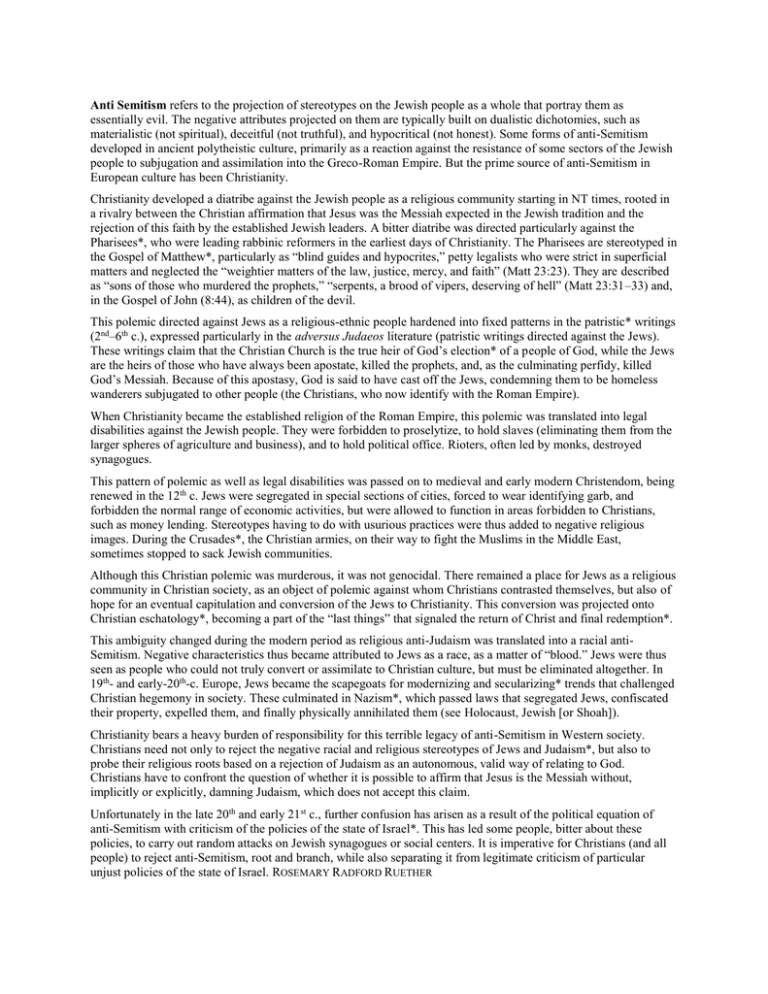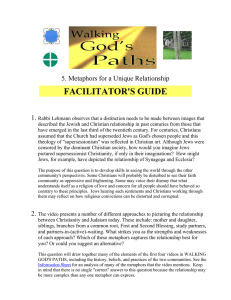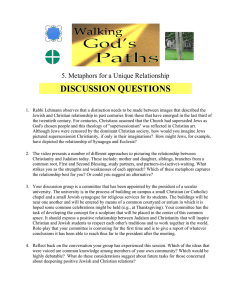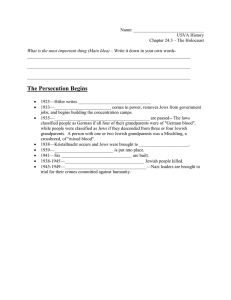Anti Semitism
advertisement

Anti Semitism refers to the projection of stereotypes on the Jewish people as a whole that portray them as essentially evil. The negative attributes projected on them are typically built on dualistic dichotomies, such as materialistic (not spiritual), deceitful (not truthful), and hypocritical (not honest). Some forms of anti-Semitism developed in ancient polytheistic culture, primarily as a reaction against the resistance of some sectors of the Jewish people to subjugation and assimilation into the Greco-Roman Empire. But the prime source of anti-Semitism in European culture has been Christianity. Christianity developed a diatribe against the Jewish people as a religious community starting in NT times, rooted in a rivalry between the Christian affirmation that Jesus was the Messiah expected in the Jewish tradition and the rejection of this faith by the established Jewish leaders. A bitter diatribe was directed particularly against the Pharisees*, who were leading rabbinic reformers in the earliest days of Christianity. The Pharisees are stereotyped in the Gospel of Matthew*, particularly as “blind guides and hypocrites,” petty legalists who were strict in superficial matters and neglected the “weightier matters of the law, justice, mercy, and faith” (Matt 23:23). They are described as “sons of those who murdered the prophets,” “serpents, a brood of vipers, deserving of hell” (Matt 23:31–33) and, in the Gospel of John (8:44), as children of the devil. This polemic directed against Jews as a religious-ethnic people hardened into fixed patterns in the patristic* writings (2nd–6th c.), expressed particularly in the adversus Judaeos literature (patristic writings directed against the Jews). These writings claim that the Christian Church is the true heir of God’s election* of a people of God, while the Jews are the heirs of those who have always been apostate, killed the prophets, and, as the culminating perfidy, killed God’s Messiah. Because of this apostasy, God is said to have cast off the Jews, condemning them to be homeless wanderers subjugated to other people (the Christians, who now identify with the Roman Empire). When Christianity became the established religion of the Roman Empire, this polemic was translated into legal disabilities against the Jewish people. They were forbidden to proselytize, to hold slaves (eliminating them from the larger spheres of agriculture and business), and to hold political office. Rioters, often led by monks, destroyed synagogues. This pattern of polemic as well as legal disabilities was passed on to medieval and early modern Christendom, being renewed in the 12th c. Jews were segregated in special sections of cities, forced to wear identifying garb, and forbidden the normal range of economic activities, but were allowed to function in areas forbidden to Christians, such as money lending. Stereotypes having to do with usurious practices were thus added to negative religious images. During the Crusades*, the Christian armies, on their way to fight the Muslims in the Middle East, sometimes stopped to sack Jewish communities. Although this Christian polemic was murderous, it was not genocidal. There remained a place for Jews as a religious community in Christian society, as an object of polemic against whom Christians contrasted themselves, but also of hope for an eventual capitulation and conversion of the Jews to Christianity. This conversion was projected onto Christian eschatology*, becoming a part of the “last things” that signaled the return of Christ and final redemption*. This ambiguity changed during the modern period as religious anti-Judaism was translated into a racial antiSemitism. Negative characteristics thus became attributed to Jews as a race, as a matter of “blood.” Jews were thus seen as people who could not truly convert or assimilate to Christian culture, but must be eliminated altogether. In 19th- and early-20th-c. Europe, Jews became the scapegoats for modernizing and secularizing* trends that challenged Christian hegemony in society. These culminated in Nazism*, which passed laws that segregated Jews, confiscated their property, expelled them, and finally physically annihilated them (see Holocaust, Jewish [or Shoah]). Christianity bears a heavy burden of responsibility for this terrible legacy of anti-Semitism in Western society. Christians need not only to reject the negative racial and religious stereotypes of Jews and Judaism*, but also to probe their religious roots based on a rejection of Judaism as an autonomous, valid way of relating to God. Christians have to confront the question of whether it is possible to affirm that Jesus is the Messiah without, implicitly or explicitly, damning Judaism, which does not accept this claim. Unfortunately in the late 20th and early 21st c., further confusion has arisen as a result of the political equation of anti-Semitism with criticism of the policies of the state of Israel*. This has led some people, bitter about these policies, to carry out random attacks on Jewish synagogues or social centers. It is imperative for Christians (and all people) to reject anti-Semitism, root and branch, while also separating it from legitimate criticism of particular unjust policies of the state of Israel. ROSEMARY RADFORD RUETHER



